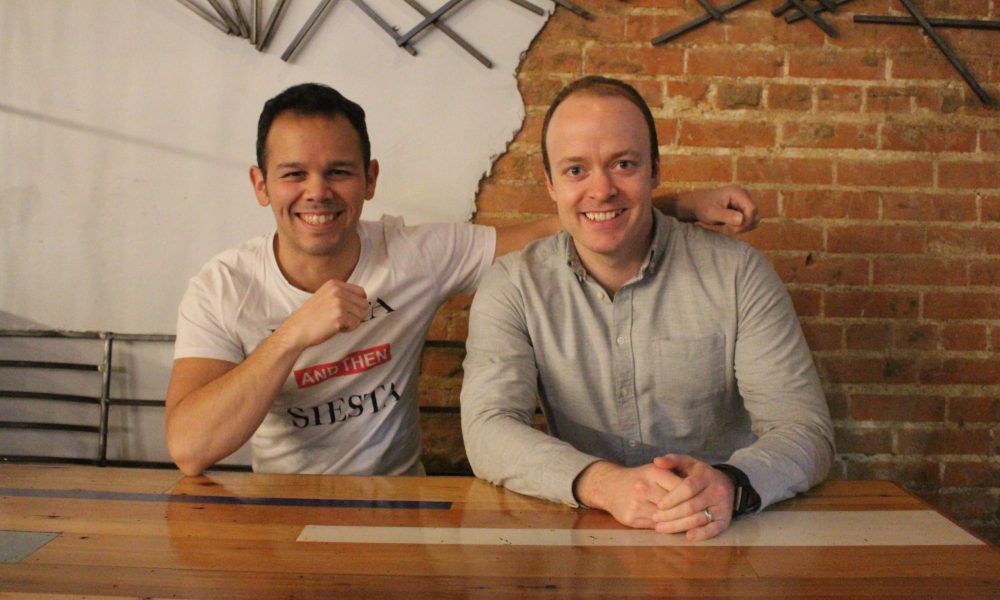

Today we’d like to introduce you to Tommy and Rory.
So, before we jump into specific questions about the business, why don’t you give us some details about you and your story.
Rory and I have been friends for over 18 years. We went to rival high schools in the Mid Cities and had a mutual best friend that introduced us. When he passed away from leukemia in 2009, Rory and I grew much closer and always kept in touch over the years.
When I came up with the idea for NickelCommerce back in 2007, I was still in college and was working as a sales intern for a huge shipping supply distributor. My job was to basically visit clients, find out what they were buying, provide them with a competitive quote, and ultimately sell products. This is a very familiar process to anyone in outside sales, and it is widely known to be an excruciatingly painful existence of a job. One day while trying to visit a client, I was met at the front door by the business owner.
He explained that he didn’t have time to meet but handed me a stack of invoices. He told me to make him an offer based on what he was paying with our competitor. We were able to beat the competitor, won the business, and an idea was born. I was going to build a website that allowed buyers to upload their invoices so that suppliers (like me) could know what everyone was paying and make them better offers.
Unfortunately, I had a soul-crushing amount of student debt at the time and had no idea how to start a technology company. Fast forward ten years. Rory is now working at a hedge fund in London by way of a strong tenure at Bank of America. I am a healthcare consultant after getting my Masters in economics. The itch to start the company was still strong, so I quit my job to learn how to code.
My very first coding project was NickelCommerce. I called Rory, convinced him to quit his job in London, and the rest, as they say, is history.
Has it been a smooth road?
It has definitely not been a smooth road for us. When trying to build something that is truly revolutionary, you should absolutely expect the road to be tough. It sort of comes with the territory. Even more so when working on a shoestring budget. Most of the turbulence for us has been around business model and technology.
For the business model part, we started out by trying to implement the idea of radical transparency. We wanted each of our customers to post a single invoice to our website, which would identify the company by name. Over time we learned that our customers didn’t like sharing their company name on our platform, so we pivoted to allow anonymity on our website. We also discovered that simply collecting a single invoice was a bad idea, because the value of business data is in the time series data. So we’ve shifted our business model to what it is now: a transparent cost tracking service that offers anonymity.
We’ve also had our fair share of technology problems. I am not only the CEO, but I am also the CTO. As such, it’s often difficult to balance the responsibilities of leading the company with the nitty-gritty technology issues of building and maintaining a complex marketplace. We’ve also been delaying building an advanced computer vision system to transcribe invoice data until we can find a CTO for the company. So if you’re reading this, and you’re an amazing Ruby/Python/JS developer, give us a shout!
So let’s switch gears a bit and go into the NickelCommerce story. Tell us more about the business.
We are the world’s first transparent marketplace. We’ve built a platform that allows B2B e-commerce to happen out in the open, rather than behind closed doors. The idea is to create a more perfect, and fairer, market using transparency.
Our business can be broken down into three parts: buyers, suppliers, and the actual NickelCommerce platform. Buyers upload their invoices each week. Suppliers can see this real invoice data and make our buyers better offers. We simply facilitate the transaction, provide search functionality, and act as the middleman.
Buyers are one side of our marketplace. For now, our buyers are primarily restaurants, bars, and coffee shops, because these types of businesses order a ton of commodity items (e.g., paper towels, napkins, trash bags, cups, gloves, etc.) on a weekly basis. For our buyers, we offer an in-depth cost tracking service, weekly price increase updates, invoice virtualization, and instant price comparisons. Most importantly, every buyer that joins NickelCommerce gets access to real invoice data from other buyers – allowing them to benchmark any deal they’re getting with what everyone else pays. The bottom line is that we save our buyers a ton of time and money in the purchasing process. As you might imagine, this is especially helpful for small businesses.
Suppliers are the other side of our equation. In the current state of the world, salespeople have to piece together a vision of any given market using imperfect data, and it is difficult to find good sales leads. Our suppliers are at an extreme advantage to their competitors, because we provide them with a steady supply of new leads coupled with real cost data from buyers on our platform – what I refer to as The Holy Grail of Sales. We also make it easy for salespeople to reach out and transact with buyers, saving time spent prospecting and cold-calling. The end result is that suppliers who join NickelCommerce have unmatched market intelligence, and dare I say, a strong competitive advantage.
Our platform is the glue that holds everything together. We designed algorithms to make sense of complex and diffuse purchasing data and to let buyers compare products from various suppliers. However, what makes our service most unique is that we built the platform with transparency in mind. Rather than trying to profit by obscuring the data we collect (like a traditional middleman), we allow everyone on the platform to see price trends for every product and business. We do this because honesty is in our DNA, and because we believe strongly in fair competition and the power of small businesses.
How do you think the industry will change over the next decade?
This may sound repetitive, but I think the answer here is transparency. I think that the world is moving towards this with each passing day. Consumers are demanding it, and it’s becoming more obvious to industry leaders that it’s also good for business.
I think this holds true not just for marketplaces like our own, but really for any situation where information or money changes hands – whether that be government, finance, media, nonprofits, traditional businesses, etc. I always say that the internet was born to spread information and that it surprises me that so much is still hidden from view all these years later.
If you had to start over, what would you have done differently?
First, I would talk to even more potential customers before building our service. There is a well-known mantra in the world of startups: “Move fast and break things.” As a creative and a builder, my instinct is just to go and do. It’s difficult for me to toe the line between moving fast and moving too fast. But hindsight is 20/20, and I am now a firm believer that there is literally no amount of “surveying” that is too much. And some things don’t need to be broken.
Another thing I would do differently is trying to raise money sooner – whether that be through an accelerator or some version of a friend and family round of financing. We are a bootstrapped company (meaning we have financed the company ourselves) and took the rather controversial stance that we didn’t want to risk ruining personal relationships by fundraising from loved ones. What we didn’t know is that it is difficult to recruit developers to work for equity in the Dallas ecosystem because the job market is so hot. A small amount of startup capital would have helped us hire sooner and ultimately tackle our problem better.
Lastly, and this is a weird one… but we probably should have gotten an office sooner. We just moved into our first office space this week, and our productivity is through the roof. Up to this point, we have tried to avoid unnecessary spend, which meant no office. But it’s clear now that it’s an expense worth having – so long as you can comfortably afford the cost.
Pricing:
- For buyers, our service is $50/mo per location, and there is no contract. The first month is free!
- For suppliers, our service is $250/mo per representative. Contact us for more info.
Contact Info:
- Website: www.nickelcommerce.com
- Phone: (972) 863-2747
- Email: admin@nickelcommerce.com






Getting in touch: VoyageDallas is built on recommendations from the community; it’s how we uncover hidden gems, so if you know someone who deserves recognition please let us know here.


















Kay
January 17, 2019 at 8:11 pm
Congratulations Tommy! Love to see this growing in such an important space!